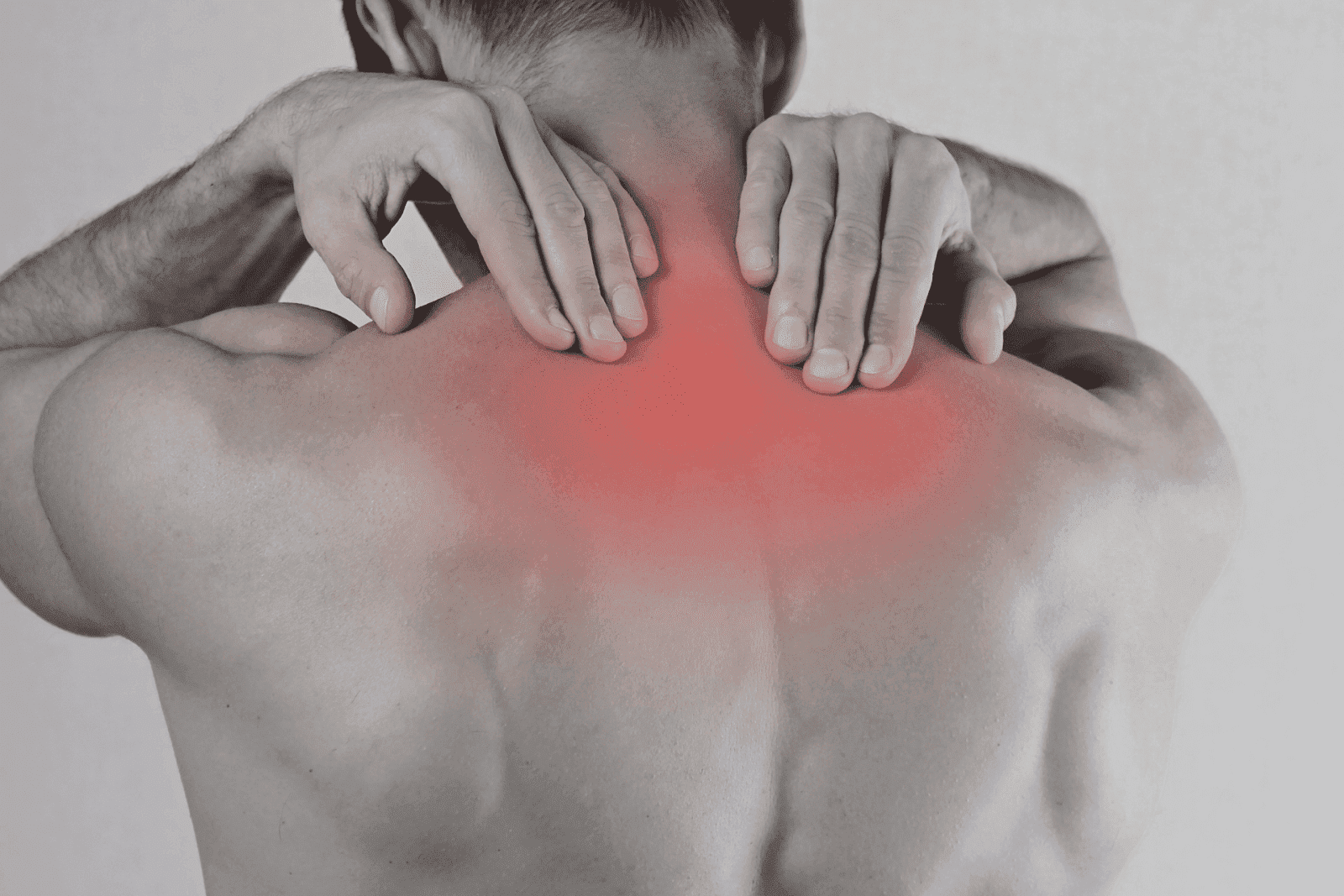What Causes Upper Back Pain When Breathing?
Experiencing upper back pain when breathing can be alarming and uncomfortable. This symptom may arise from a variety of causes, ranging from minor muscle strain to more [...]
Read More
Medically reviewed by Alan Lucks | MD, Alan Lucks MDPC Private Practice - New York on October 12th, 2025.
Costochondritis—inflammation of rib cartilage where ribs attach to the breastbone—causes sharp pain that worsens with deep breaths and typically affects the 2nd through 5th ribs most commonly.
Muscle strain from lifting heavy objects or maintaining hunched posture for hours creates trigger points in the rhomboids and intercostal muscles that become painful during chest expansion.
Pleurisy occurs when the thin membranes lining the lungs become inflamed, creating a distinctive sharp, stabbing sensation that intensifies with each breath and often follows respiratory infections.
Pulmonary embolism blocks blood flow to lung tissue and presents as sudden-onset back pain with breathing difficulty—this life-threatening condition requires emergency treatment within hours.
Heart-related causes like myocardial infarction can radiate pain to the upper back and shoulder blades, particularly in women, and may worsen during exertion or deep breathing.
Experiencing upper back pain when breathing can be alarming and uncomfortable. This symptom may arise from a variety of causes, ranging from minor muscle strain to more serious medical conditions. Understanding the potential reasons behind this pain is crucial for seeking appropriate care and relief. This article explores the common causes of upper back pain during breathing, symptoms to watch for, and when to seek medical advice.
Upper back pain refers to discomfort or aching felt in the region between the base of the neck and the bottom of the rib cage. When this pain intensifies or occurs specifically during breathing, it suggests involvement of the muscles, bones, nerves, or organs related to respiration.
Breathing requires the coordinated effort of the diaphragm, intercostal muscles (muscles between the ribs), and accessory muscles in the upper back and chest. If any of these structures become inflamed, strained, or injured, it can lead to pain that worsens with inhalation or exhalation.
 How Breathing Affects Upper Back Pain
How Breathing Affects Upper Back PainDuring deep breaths, the chest expands, and muscles around the ribs and spine stretch and contract. If these muscles or the surrounding tissues are compromised, the movement can trigger pain. Additionally, conditions affecting the lungs or pleura (the lining around the lungs) can cause pain that is felt in the upper back when breathing.
In many cases, poor posture can exacerbate upper back pain, particularly in individuals who spend long hours sitting at desks or using computers. Slouching can lead to tightness in the upper back muscles and strain on the respiratory muscles, making it difficult to take full, deep breaths. This creates a cycle where shallow breathing further contributes to muscle tension, leading to increased discomfort. Regular breaks, stretching, and ergonomic adjustments can help alleviate some of this strain, promoting better posture and more effective breathing patterns.
Moreover, stress and anxiety can also play a significant role in upper back pain. When individuals are under emotional distress, they may unconsciously tense their upper back and shoulder muscles, which can lead to discomfort. This tension can hinder the natural movement of the rib cage during breathing, resulting in a feeling of tightness or pain in the upper back. Techniques such as mindfulness, yoga, or deep-breathing exercises can be beneficial in managing both stress and the associated physical symptoms, fostering a more relaxed state that supports both muscle recovery and respiratory function.
Several factors can contribute to upper back pain associated with breathing. Some causes are benign and temporary, while others may require prompt medical attention.
One of the most frequent causes of upper back pain during breathing is muscle strain. Overuse, poor posture, heavy lifting, or sudden movements can injure muscles in the upper back or chest wall. This leads to inflammation and pain that worsens with breathing, coughing, or twisting.
For example, athletes or individuals who engage in repetitive upper-body activities may develop strained muscles that cause discomfort when expanding the chest.
Costochondritis is inflammation of the cartilage that connects the ribs to the breastbone. This condition can cause sharp or aching pain in the chest that radiates to the upper back, especially during deep breaths or coughing.
Though costochondritis is generally benign, the pain can be severe and mimic heart or lung problems, so proper diagnosis is important.
Poor posture, especially from prolonged sitting or working at a computer, can strain the muscles and ligaments in the upper back. This may cause pain that becomes noticeable when taking deep breaths due to restricted movement of the rib cage.
Additionally, spinal conditions such as herniated discs, osteoarthritis, or spinal stenosis can irritate nerves or cause inflammation, leading to upper back pain that worsens with breathing.
Several lung conditions can cause upper back pain during breathing, including:
Pleurisy: Inflammation of the pleura, the lining around the lungs, often causes sharp pain that worsens with deep breaths.
Pneumonia: Infection in the lungs can cause localized pain in the upper back, fever, and difficulty breathing.
Pulmonary Embolism: A blood clot in the lungs can cause sudden, severe upper back pain and shortness of breath, requiring emergency care.
Because these conditions can be serious, anyone experiencing sudden or severe upper back pain with breathing difficulties should seek immediate medical evaluation.
Though less common, some heart conditions, such as angina or a heart attack, may present with pain radiating to the upper back, especially during exertion or deep breathing. This pain is often accompanied by other symptoms such as chest pressure, sweating, nausea, or dizziness.
If heart-related causes are suspected, urgent medical attention is critical.
Recognizing accompanying symptoms can help determine the severity and possible cause of upper back pain related to breathing.
Shortness of Breath: Difficulty breathing or feeling breathless may indicate lung or heart involvement.
Fever and Chills: Suggest infection such as pneumonia or pleurisy.
Chest Pain: Pain in the chest, along with upper back pain, may point to cardiac or lung issues.
Numbness or Tingling: Could indicate nerve irritation or spinal problems.
Persistent or Worsening Pain: Pain that does not improve or worsens over time warrants medical evaluation.
Upper back pain with breathing can range from minor to life-threatening causes. It is important to seek medical advice if the pain is severe, sudden, or accompanied by symptoms like shortness of breath, chest pain, or fever.
For many patients, accessing timely care can be challenging. This is where telehealth services like Doctronic.ai come in. Doctronic offers fast, affordable, and convenient telehealth visits with licensed doctors available 24/7 across all 50 states. Whether you need a quick consultation for upper back pain or a second opinion on your symptoms, Doctronic’s AI-powered platform provides comprehensive medical advice drawing on the latest peer-reviewed research.
With over 10 million users and growing rapidly, Doctronic’s AI doctor remembers your medical history and provides personalized care instantly. This can be especially helpful for those experiencing upper back pain when breathing, as you can get expert guidance without waiting days for an appointment.
Immediate Access: Get answers in seconds, not hours or days.
Expert Recommendations: AI synthesizes the latest medical research for accurate advice.
Personalized Care: The AI remembers your health history for tailored recommendations.
Affordable Telehealth Visits: Video consultations with doctors for under $40.
Convenience: Available anytime, anywhere in the US.
For anyone experiencing upper back pain when breathing, starting with a telehealth visit at Doctronic.ai can be a smart first step. It allows you to understand your symptoms better and decide if in-person care is necessary.
While some causes of upper back pain require medical treatment, many cases related to muscle strain or poor posture can be prevented with simple lifestyle changes.
Sitting and standing with proper alignment reduces strain on the upper back muscles and spine. Ergonomic workstations and regular breaks from sitting can help maintain healthy posture.
Strengthening the upper back and core muscles improves support for the spine and rib cage. Stretching exercises can also enhance flexibility and reduce muscle tightness.
Using proper techniques when lifting heavy objects and avoiding sudden twisting motions can prevent muscle injuries.
Stress can cause muscle tension in the upper back, worsening pain. Techniques such as deep breathing, meditation, and yoga may help alleviate tension.
 From Discomfort to Diagnosis: Managing Upper Back Pain
From Discomfort to Diagnosis: Managing Upper Back PainUpper back pain when breathing is a symptom that should not be ignored. It can result from simple muscle strain or indicate more serious lung, heart, or spinal conditions. Understanding the potential causes and accompanying symptoms can guide timely and appropriate care.
For quick, reliable medical advice and telehealth visits, Doctronic.ai offers an innovative AI-powered platform that combines the latest medical knowledge with personalized care. Whether you need a free AI diagnosis or an affordable video visit with a licensed doctor, Doctronic is revolutionizing access to primary care across the United States.
If you or a loved one experiences upper back pain when breathing, consider using Doctronic to get fast answers and peace of mind from the comfort of your home.
Don't let upper back pain disrupt your life. With Doctronic, you can access the #1 AI Doctor instantly, from anywhere. Our AI-powered platform provides free, personalized medical advice based on the latest peer-reviewed research, ensuring you receive the most modern and accurate care. If you need more than AI guidance, our telehealth video visits connect you with licensed doctors 24/7 for under $40. Over 10 million people have already experienced the Doctronic difference. Skip the line. Talk to an AI Doctor Now, for free.
Most breathing-related back pain stems from treatable muscle or cartilage issues, but sudden severe pain with shortness of breath, chest pressure, or fever above 101°F requires immediate medical evaluation. If you're experiencing persistent symptoms or need help determining the severity of your condition, Doctronic can provide personalized guidance.
Experiencing upper back pain when breathing can be alarming and uncomfortable. This symptom may arise from a variety of causes, ranging from minor muscle strain to more [...]
Read More